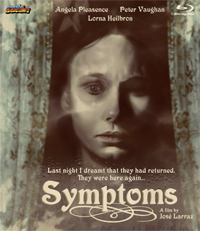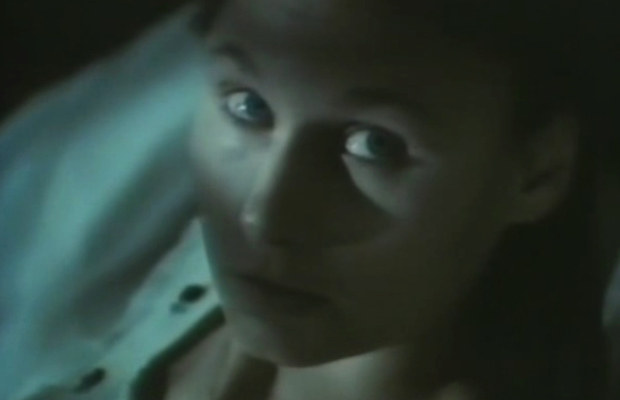
From her introductory scenes, it is crystal clear something’s not right with the wide-eyed, quiet spoken Helen (Pleasance), and Curtis Harrington’s 1971 thriller What’s the Matter with Helen? seems the more apt title. Helen’s omniscient narration, “Last night I dreamt they had returned,” conjures the essence of Daphne du Maurier in opening moments as she writes in her dear diary. A more or less banal conversation with pixie-ish Anne (Lorna Heilbron) as her newly invited house guest causes ripples of emotion in Helen, who has to take a moment to recover from a wave of sadness. But we gather Helen’s recent stint of ‘convalescing’ in Switzerland, would indicate a nervous breakdown, and Anne as a sympathetic friend along to keep the lonely woman company (much to the chagrin of a man who appears to be Anne’s boyfriend, repeatedly appearing to lure her back home). Framed portraits of Helen’s other ‘friend’ Cora (Marie-Paule Mailleux) appear throughout the house, a solemn looking brunette we caught just a glimpse of with the menacing handyman, Brady (Peter Vaughan), a man Helen despises vehemently, yet refuses to get rid of. Where Cora went or why seems to be anyone’s guess. Eventually, Anne learns, a bit too late, of Helen’s ulterior motives.
It nearly goes without saying Helen seems to be suffering from some severe emotional neuroses directly related to her troubled sexual orientation. While Pleasance’s unhinged madwoman recalls Polanski, the look and feel of the film are reminiscent of a slew of ambient genre films from the period, like Let’s Scare Jessica to Death (1971). UK DP Trevor Wrenn would never lens another film, and yet, his quaggy English countryside, all damp, rotting foliage in shallow ponds underneath overcast skies, also recalls the manor side vibes of Nicolas Roeg’s Don’t Look Now (1973).
Interestingly, we spend a lot of time with Heilbron’s hopelessly naive Anne, so much so she nearly takes on the stature of a heroine. Character actor Peter Vaughan (Straw Dogs, 1971) is well cast as the lascivious handyman, but Larraz’s screenplay (co-written by Stanley Miller from a story by Thomas Owen) doesn’t seem too keen on fooling us about what happened to Cora, what’s probably going to happen to Anne, and why Helen’s acting so strangely (though an alarming sexual fantasy sequence plays all the more eerily thanks to its placement in the narrative, even if it hints at the rather obvious ‘deluge’ allowed by ‘penetration’). The Spanish born Larraz (who passed away in 2013) is best remembered for his 1974 sexploitation classic Vampyres, followed by a steady filmography of similarly themed genre efforts up until the early 90s. Symptoms, despite its obvious narrative thrusts, is something a bit more complex and subtle, in comparison.
Disc Review:
In 2008, the BFI listed Symptoms on their ‘most wanted’ list of missing films, and negatives were discovered in 2014. Mondo Macabro presents the title in a new HD transfer from the film negative in 1.33:1, available for the first time in forty years. Picture and sound quality are clear, and several significant special features are worth thumbing through.
On Vampyres and Other Symptoms – A Film By Celia Novis:
A documentary feature by Celia Novis concerns the career of Jose Larraz. The one hour and thirteen minute feature from 2011 features Larraz himself in a deliberation of his work as a filmmaker.
From Barcelona to Tunbridge Wells – The Films of Jose Larraz:
This twenty-four minute segment features archive footage of Larraz and his films in this narrated examination.
Brian Smedley-Aston Interview:
Editor Brian Smedley-Aston gives a seventeen minute interview on his career and experience working on Symptoms.
Angela Pleasance Interview:
Pleasance gives a near ten minute interview, explaining how she received the role only because the first choice, Jean Seberg, wasn’t able to work in the UK.
Lorna Heilbron Interview:
Lorna Heilbron appears for this eighteen minute interview to discuss her entry into acting and how she became involved with the film production.
Final Thoughts:
Fans of vintage atmospheric horror films featuring unhinged, emotionally damaged women should definitely enjoy Angela Pleasance in this resurrected gem, even if they know what to expect.
Film Review: ★★★½/☆☆☆☆☆
Disc Review: ★★★½/☆☆☆☆☆
